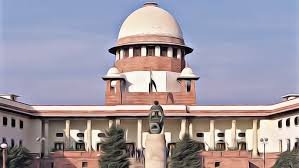The dispute revolves around the validity of the acquisition of land (CTS Nos. 119 I and 119 I/1-83 in Village Tungwa, Taluka Kurla, Mumbai, admeasuring 9,054 sq. m. – the “Subject Land”) belonging to Indian Cork Mills Private Limited (ICM). A portion of this land was declared a ‘Slum Area’ in 1979, which later expanded. In 2002, slum dwellers formed the Tarabai Nagar Co-Op. Housing Society (Proposed) (Tarabai Society). The entire Subject Land was declared a Slum Rehabilitation Area (SR Area) in 2011.
Tarabai Society repeatedly requested the land’s acquisition for redevelopment. Despite ICM’s continuous expressions of willingness to redevelop the land itself under a Slum Rehabilitation Scheme (SR Scheme), the Slum Rehabilitation Authority (SRA) and the State of Maharashtra proceeded with acquisition. The State Government issued a notification dated 22.12.2016 for the acquisition of the Subject Land under Section 14(1) of the Slums Act.
ICM challenged this acquisition in the Bombay High Court, which held the acquisition void. The High Court found that a landowner has a preferential right to develop and that the SRA was obligated to invite the owner to submit an SR Scheme. Aggrieved, Tarabai Society, the State of Maharashtra, and the SRA appealed to the Supreme Court.
Law Involved:
The core of the legal analysis lies in the Maharashtra Slum Areas (Improvement, Clearance and Redevelopment) Act, 1971 (Slums Act), particularly its amended Chapter I-A (Slum Rehabilitation), introduced in 1995.
Section 3B(4)(c) & (e): These provisions outline parameters for the SR Scheme, including obligatory participation of landholders and occupants, and options for landholders and occupants to develop by themselves or through a developer, with the SRA stepping in only if they do not participate.
Section 3C(1): Allows the CEO of SRA to declare an area as a ‘Slum Rehabilitation Area’ (SR Area).
Section 12(10) (as modified by Section 3D(b)(ii)): Grants the owner of the land the right to redevelop after a Clearance Order.
Section 13 (substituted by Section 3D(b)(iii)): Empowers the SRA to develop an SR Area if landholders or occupants do not come forward within a reasonable time with a redevelopment scheme.
Section 14 (as modified by Section 3D(c)(i)): Grants the State Government the power to acquire land to enable the SRA to carry out development under an SR Scheme.
SRA Circular No. 144-A (09.11.2015): Explicitly recognizes the ‘first right to file the Slum Rehabilitation scheme is of the owner of the land’.
Development Control Regulations for Greater Mumbai, 1991 (DCR 1991), Regulation 33(10): Provides a regulatory framework and incentives for slum redevelopment plans.
Court’s Reasoning:
- Existence of Preferential Right to Develop:
The Court found that Chapter I-A of the Slums Act, specifically Sections 12(10), 3B(4)(e), and 13(1), along with SRA Circular 144-A, unambiguously establishes a preferential right for the landowner to redevelop an SR Area.
This right stems from inherent ownership rights (constitutionally protected) and is also balanced by the state’s duty towards slum dwellers.
Allowing the SRA discretion or equal priority to other proposals when the owner is willing would lead to discriminatory and arbitrary results, fostering an “unholy nexus” with private developers and potentially exploiting slum dwellers and stripping owners of their land.
- Requirement of Specific Notice/Invitation to Owner:
The Court held that the preferential right entails a mandatory requirement for the SRA to issue a specific notice-cum-invitation to the owner to submit an SR Scheme.
Mere publication of the Section 3C(1) Declaration in the Official Gazette is insufficient as it does not invite the owner to submit a proposal.
Owners require SRA’s support (e.g., for surveys, demarcation) to prepare a complete SR Scheme as mandated by regulations.
The potential adverse consequences for the owner (loss of development rights, acquisition at meagre compensation) amplify the need for prior notice.
The SRA’s own past practice of issuing such specific notices further supported this requirement.
- Interplay of Acquisition (Section 14) and Redevelopment (Section 13):
The Court clarified that the State’s power to acquire land under Section 14 is not independent but is linked to Section 13.
Acquisition becomes necessary only if the SRA needs the land to carry out development when the owner is unwilling or fails to act within a reasonable time, thereby extinguishing their preferential right.
Acquisition cannot proceed if the owner is willing to redevelop in exercise of their preferential right.
The Court distinguished its earlier decision in Murlidhar Teckchand Gandhi because that case dealt with the original framework of the Slums Act, which did not confer a preferential right on the owner and had a broader scope of acquisition compared to the Chapter I-A framework.
- Validity of the Acquisition in the Instant Case:
The Court found no necessity to acquire the land as the SRA never issued a specific notice to ICM, and ICM consistently demonstrated willingness to redevelop.
The Court noted “doubtful conduct” and “mala fide intention” on the part of Tarabai Society and its developer, who sought acquisition to benefit a private builder and manipulated slum dwellers’ rights.
The SRA’s conduct was “troubling”, showing a pattern of shifting positions, unresponsiveness to ICM’s requests for assistance, and disregarding its own internal recommendations and the Deputy Secretary’s directives to give ICM an opportunity.
The acquisition, in these circumstances, was deemed a “colourable exercise of power” and could not be sustained.
Holding:
The Supreme Court dismissed the appeals, upholding the High Court’s judgment. The High Court’s finding that the acquisition was void was affirmed. The previous status quo order was vacated. ICM was granted liberty to submit a fresh SR Scheme for redevelopment of the Subject Land within 120 days, strictly in accordance with current laws and regulations. The SRA and the State were directed to process ICM’s proposal expeditiously, within 60 days of submission.
Tarabai Nagar Co-Op. Hog. Society (Proposed) V. The State of Maharashtra and others
Supreme Court: 2025 INSC 1015 (DoJ 22-08-2025)
2025 INSC 1015 Download Supreme Court File






